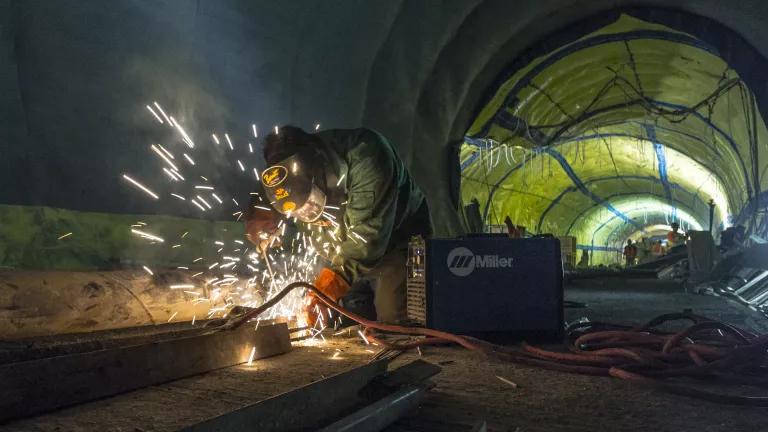Rumors have been swirling today that New York is lifting its moratorium on new fracking in the Marcellus Shale. Here’s the reality: the de facto moratorium that has been in place since the summer of 2008 remains intact.
And in fact, the Department of Environmental Conservation is for the first time proposing to place significant portions of the state formally off-limits to industrial gas drilling. They are also proposing a variety of strict new safeguards. These proposed measures appear to represent a step in the right direction, but a full review of the state’s proposal is required before it can be determined whether New York’s drinking water, public health and communities are fully protected.
As for tomorrow’s announcement, here’s what is actually happening: DEC is issuing an incomplete version of its revised “draft supplemental generic environmental impact statement.” That is the draft environmental review assessment it has been working on for the past three years. As indicated by DEC’s press release issued this afternoon, the document is the latest step in an on-going legal process to assess the environmental and health impacts of proposed new fracking. In other words – they’re announcing a work in progress. And – importantly – during this process no new fracking permits will be issued.
It’s critical to point out that before the de facto moratorium could be lifted, the DEC is legally required to ensure the following occurs:
- DEC must complete the revised draft, as the version to be released tomorrow will still be missing a number of key analyses, including impacts on local communities.
- DEC must then issue the complete revised draft document for a formal public comment period, reportedly sometime in August.
- DEC must evaluate and respond to all substantive comments received during the formal comment period (this is what they have been doing for the past year-and-a-half with the more than 13,000 comments they received on the initial draft back in December 2009).
- DEC must issue a final supplemental generic environmental impact statement that incorporates all public comments.
All of this will take a minimum of many months to complete.
DEC’s release indicates that – as has long been urged by NRDC and others – at the end of this legal environmental review process, it will conduct a formal rulemaking process so that the recommendations and conditions set forth in the review document are then set forth in legally binding uniform rules. If, as we have also urged, the agency holds off on issuing new permits until the completion of that regulatory process, the de facto moratorium would last that much longer.
Here are some key items worth noting in today’s release:
- Fracking would be prohibited within the New York City and Syracuse watersheds.
- Fracking would be prohibited in “primary aquifers,” which serve as public drinking water supplies; and site-specific environmental review would be required in “principal aquifers,” which serve as back-up drinking water supplies.
- Fracking would be prohibited in floodplains.
- Fracking would be prohibited on state lands.
- New casing and cementing requirements would be imposed (accidents in casing and cementing are what have led to most serious drinking water contamination cases in Pennsylvania and other parts of the country).
- New setbacks would be established from private and public drinking water wells.
Obviously, before the protectiveness of these and other provisions can be fully evaluated, we will need time to carefully review the revised draft document itself. But these appear to represent real improvements over the initial draft released in September 2009.
But there is still a long way to go before this process is complete. We look forward to DEC and the Administration conducting a robust public discussion about the recommendations contains in the revised draft. And we will continue to participate vigorously in the formal public comment process to ensure that new fracking doesn’t move forward in New York unless and until it can be demonstrated that New Yorkers’ health and environment are being protected to the maximum extent. (DEC has indicated it will provide a 60-day comment period commencing sometime in August, which should be lengthened, along with a commitment to formal hearings across affected parts of the state.)
Concerns continue to arise around the nation about the impacts – to drinking water, air quality, lands and communities – of inadequately regulated fracking. If done right, the on-going process in New York continues to hold out the best opportunity to establish a national, and even international, model of how taking a cautious approach to proposed new fossil fuel development can protect people, communities and the environment at large.

